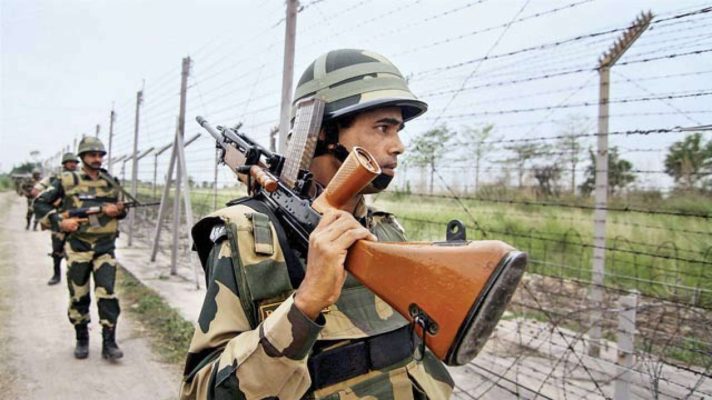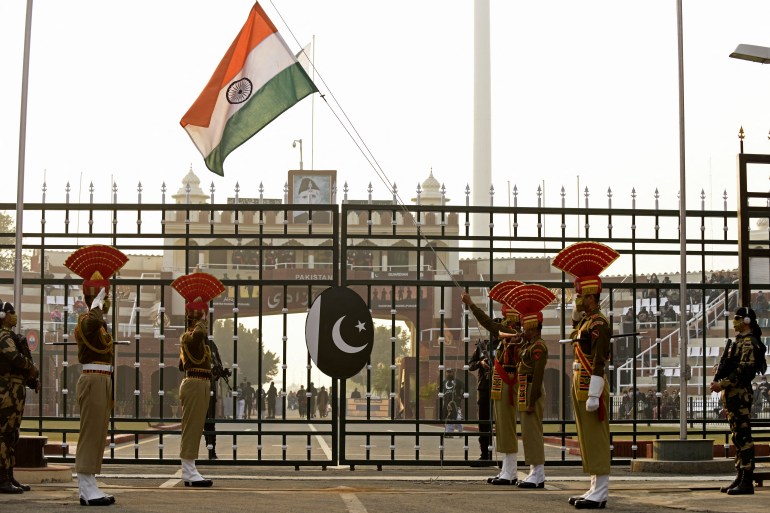
In rare move, India and Pakistan agree to ‘strict observance’ of ceasefire along the de facto border in disputed Kashmir.
Pakistan and India’s militaries have agreed to strictly observe a ceasefire at the de facto border between the two countries in the disputed region of Kashmir, and other agreements, according to a Pakistani military statement – a rare thaw in relations between the South Asian neighbours.
![Indian army soldiers patrol along the border fence at India-Pakistan Line of Control (LoC) on the forward post of Poonch district [File: Jaipal Singh/EPA]](https://www.aljazeera.com/wp-content/uploads/2021/02/h_56573653.jpg?resize=770%2C513)
The director-general’s of military operations (DGMO) of the Indian and Pakistani military held discussions over a hotline between their offices on Thursday morning, a Pakistani military statement said.
“Both sides agreed for strict observance of all agreements, understandings and cease firing along the [Line of Control] and all other sectors, with effect from midnight [on Friday],” said the statement.
The statement said talks were held “in a free, frank and cordial atmosphere”.
 Indian Border Security Force (BSF) soldiers perform during the daily Beating the Retreat ceremony on New Year’s Eve at the India-Pakistan Wagah border post
Indian Border Security Force (BSF) soldiers perform during the daily Beating the Retreat ceremony on New Year’s Eve at the India-Pakistan Wagah border post
A ceasefire has been in place at the Line of Control (LoC), which divides Indian-administered and Pakistan-administered Kashmir, since 2003, but it is frequently violated by both sides, resulting in civilian and military casualties.
Last year, Indian small arms, and mortar fire and artillery shells killed at least 28 civilians and wounded 257 more in Pakistan-administered Kashmir, according to Pakistan’s foreign office.
Since January 1, Pakistan says Indian forces have violated the ceasefire at least 175 times, wounding eight civilians.
In 2020, Pakistan violated the ceasefire along the LoC at least 5,133 times, resulting in 22 civilians and 24 soldiers being killed, as well as 197 injuries, according to India’s home affairs ministry.
The two nuclear-armed countries have fought three full-scale wars and several smaller conflicts since they gained independence from the British in 1947. Two of those three wars were over the region of Kashmir, which both claim in full but administer separate portions of.
Relations have come to a standstill since February 2019, when India accused a Pakistan-based armed group of carrying out an attack that killed more than 30 Indian security personnel in the Indian-administered Kashmir town of Pulwama.
India carried out an air strike on Pakistani soil days later, resulting in retaliatory strikes by Pakistan and an aerial dogfight that saw at least one Indian fighter jet shot down by Pakistan.
Hostilities cooled after Pakistan returned the pilot of that aircraft, but relations have remained frozen. India accuses Pakistan of supporting armed groups that target Indian security forces in Kashmir and elsewhere, while Pakistan has made the same allegation against India’s intelligence service regarding attacks by armed groups on Pakistani soil.

Late last year, Pakistan upped the temperature of the rhetoric, saying it had “credible evidence” that India was preparing for a repeat of the 2019 air strikes, a month after it shared intelligence information that it said linked India to attacks in Pakistan.
India’s foreign ministry said Pakistan’s accusations “enjoy no credibility, are fabricated and represent figments of imagination”.
In an exclusive interview with Al Jazeera in January, Pakistani Foreign Minister Shah Mehmood Qureshi said the “onus” of restarting talks was on India, demanding that security and constitutional measures that New Delhi had taken in Kashmir be reversed.
